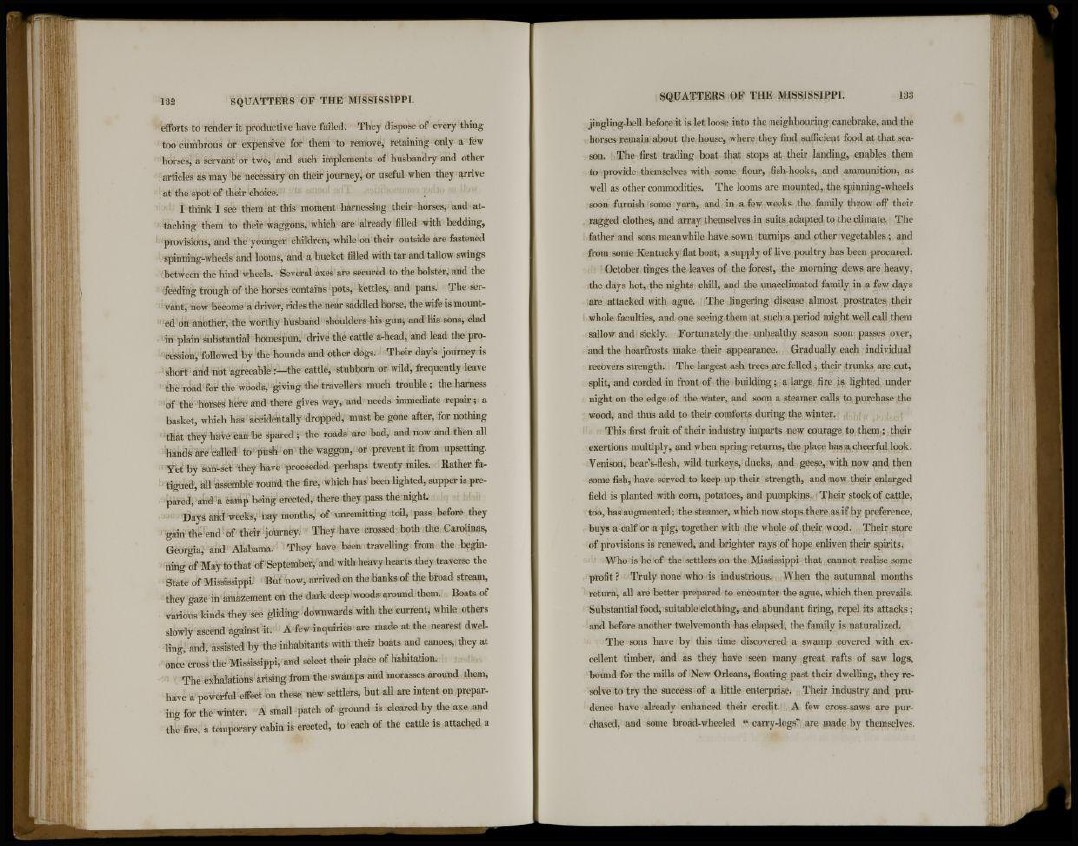
132 SQUATTERS OF THE MISSISSIPPI.
efforts to render it productive have failed. They dispose of every thing
too cumbrous or expensive for them to remove, retaining only a few
horses, a servant or two, and such implements of husbandry and other
articles as may be necessary on their journey, or useful when they arrive
at the spot of their choice.
I think I see them at this moment harnessing their horses, and attaching
them to their waggons, which are already filled with bedding,
provisions, and the younger children, while on their outside are fastened
spinning-wheels and looms, and a bucket filled with tar and tallow swings
between the hind wheels. Several axes are secured to the bolster, and the
feeding trough of the horses contains pots, kettles, and pans. The servant,
now become a driver, rides the near saddled horse, the wife is mounted
on another, the worthy husband shoulders his gun;, and liis sons, clad
in plain substantial homespun, drive the cattle a-head, and lead the procession,
followed by the hounds and other dogs. Their day's journey is
short and not agreeable :—the cattle, stubborn or wild, frequently leave
the road for the woods, giving the travellers much trouble; the harness
of the horses here and there gives way, and needs immediate repair; a
basket, which has accidentally dropped, must be gone after, for nothing
that they have can be spared ; the roads are had, and now and then all
hands are called to push on the waggon, or prevent it from upsetting.
Yet by sun-set they have proceeded perhaps twenty miles. Rather fatigued,
all assemble round the fire, which has been lighted, supper is prepared,
and a camp being erected, there they pass the night.
Days and weeks, nay months, of unremitting toil, pass before they
gain the end of their journey. They have crossed both the Carolinas,
Georgia, and Alabama. They have been travelling from the beginning
of May to that of September, and with heavy hearts they traverse the
State of Mississippi. But now, arrived on the banks of the broad stream,
they gaze in amazement on the dark deep woods around them. Boats of
various kinds they see gliding downwards with the current, while others
slowly ascend against it. A few inquiries are made at the nearest dwelling,
and, assisted by the inhabitants with their boats and canoes, they at
once cross the Mississippi, and select their place of habitation.
The exhalations arising from the swamps and morasses around them,
have a powerful effect on these new settlers, but all are intent on preparing
for the winter. A small patch of ground is cleared by the axe and
the fire, a temporary cabin is erected, to each of the cattle is attached a
SQUATTERS OF THE MISSISSIPPI. 133
jingling-bell before it is let loose into the neighbouring canebrake, and the
horses remain about the house, where they find sufficient food at that season.
The first trading boat that stops at their landing, enables them
to provide themselves with some flour, fish-hooks, and ammunition, as
well as other commodities. The looms are mounted, the spinning-wheels
soon furnish some yarn, and in a few weeks the family throw off their
ragged clothes, and array themselves in suits adapted to the climate. The
father and sons meanwhile have sown turnips and other vegetables ; and
from some Kentucky flat boat, a supply of live poultry has been procured.
October tinges the leaves of the forest, the morning dews are heavy,
the days hot, the nights chill, and the unacclimated family in a few days
are attacked with ague. The fingering disease almost prostrates their
whole faculties, and one seeing them at such a period might well call them
sallow and sickly. Fortunately the unhealthy season soon passes over,
and the hoarfrosts make their appearance. Gradually each individual
recovers strength. The largest ash trees are felled ; their trunks are cut,
split, and corded in front of the building; a large fire is lighted under
night on the edge of the water, and soon a steamer calls to purchase the
wood, and thus add to their comforts during the winter.
This first fruit of their industry imparts new courage to them ; their
exertions multiply, and when spring returns, the place has a cheerful look.
Venison, bear's-flesh, wild turkeys, ducks, and geese, with now and then
some fish, have served to keep up their strength, and now their enlarged
field is planted with corn, potatoes, and pumpkins. Their stock of cattle,
too, has augmented; the steamer, which now stops there as if by preference,
buys a calf or a pig, together with the whole of their wood. Their store
of provisions is renewed, and brighter rays of hope enliven their spirits.
Who is he of the settlers on the Mississippi that cannot realise some
profit ? Truly none who is industrious. When the autumnal months
return, all are better prepared to encounter the ague, which then prevails.
Substantial food, suitable clothing, and abundant firing, repel its attacks;
and before another twelvemonth has elapsed, the family is naturalized.
The sons have by this time discovered a swamp covered with excellent
timber, and as they have seen many great rafts of saw logs,
bound for the mills of New Orleans, floating past their dwelling, they resolve
to try the success of a little enterprise. Their industry and prudence
have already enhanced their credit. A few cross-saws are purchased,
and some broad-wheeled " carry-logs" are made by themselves.